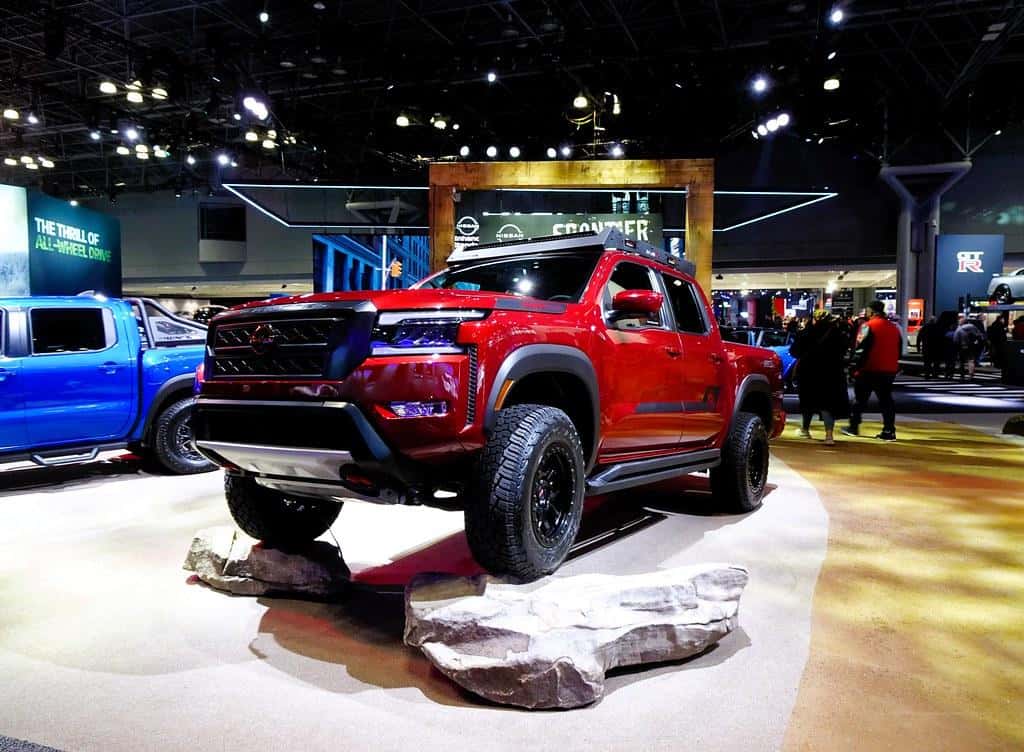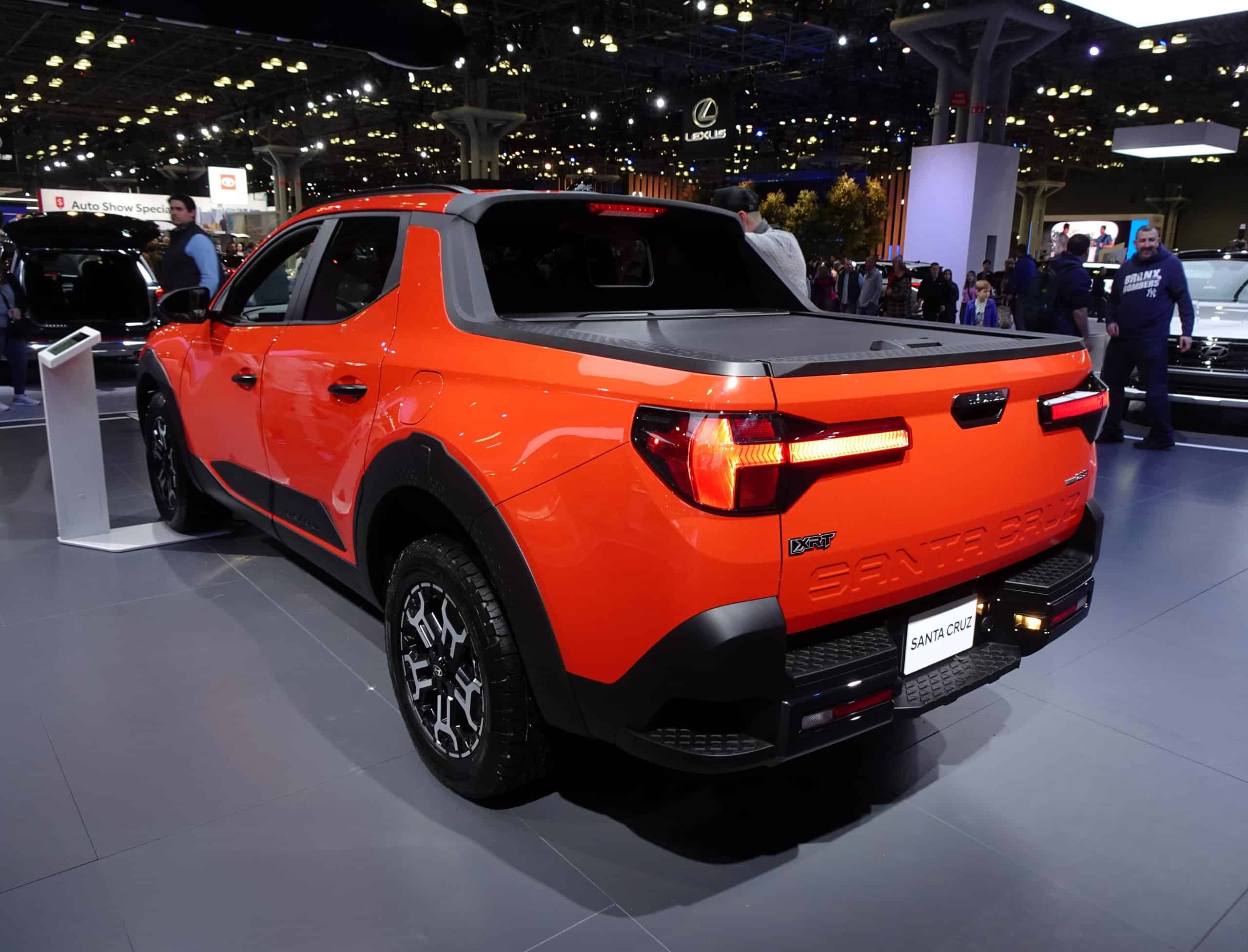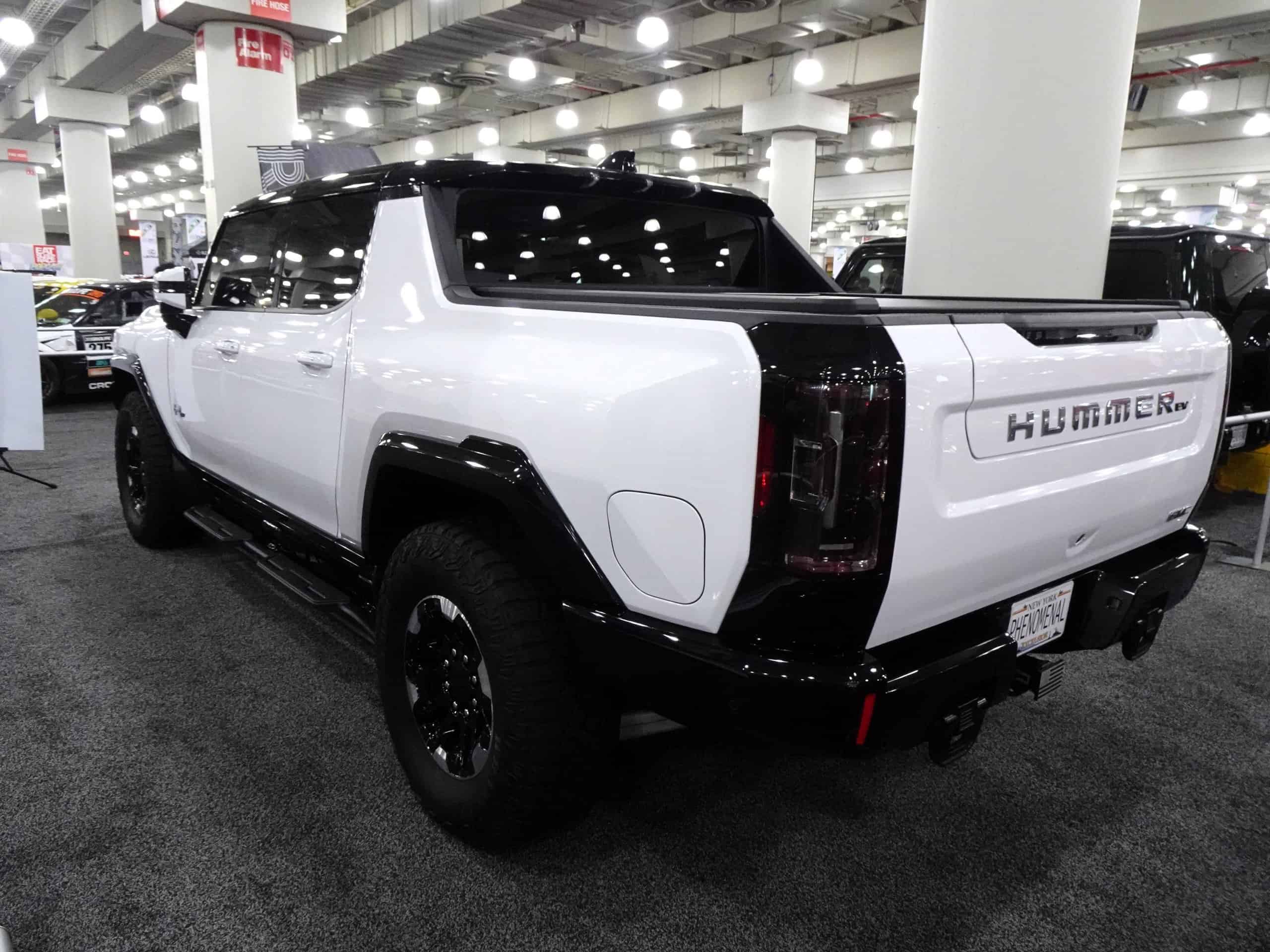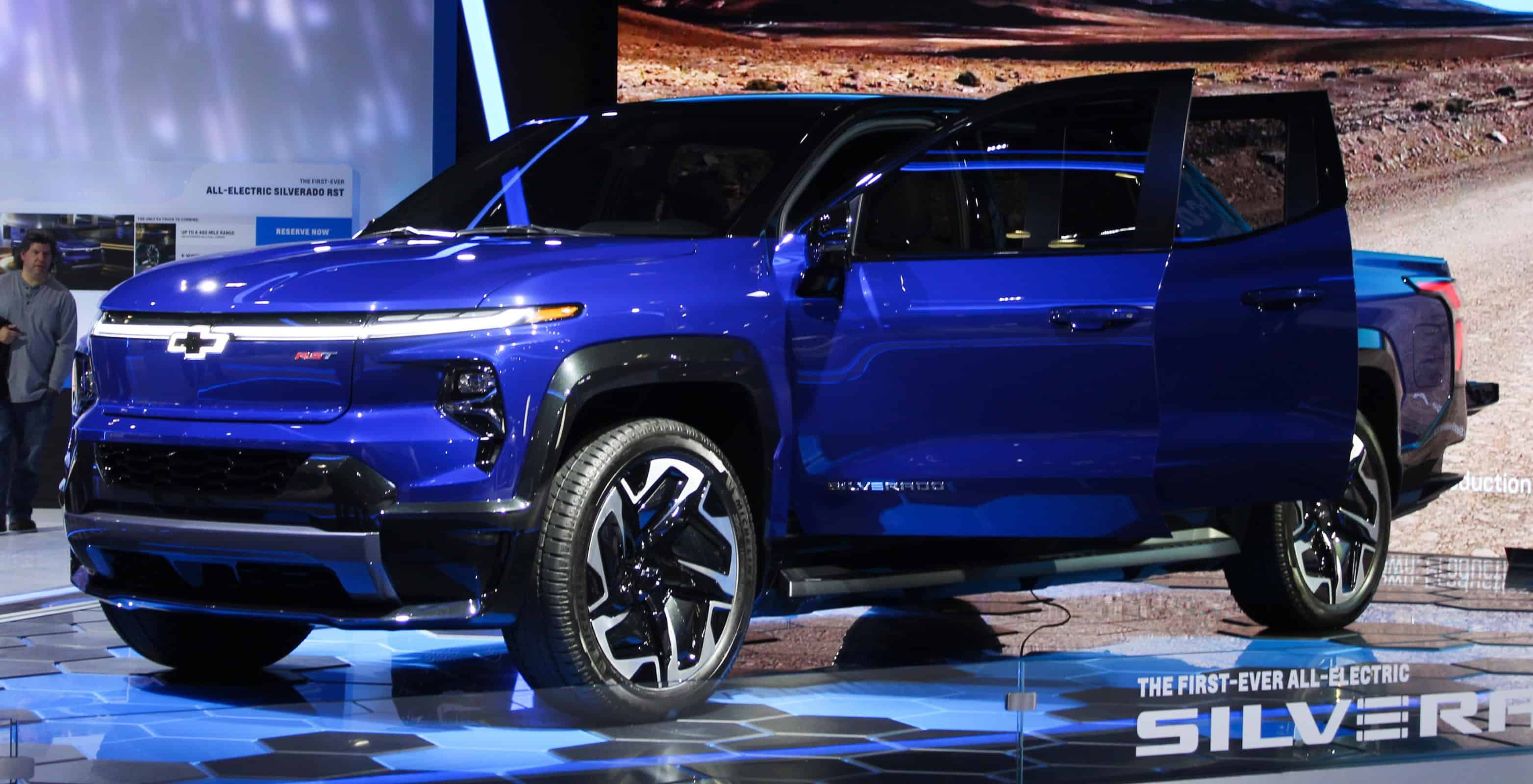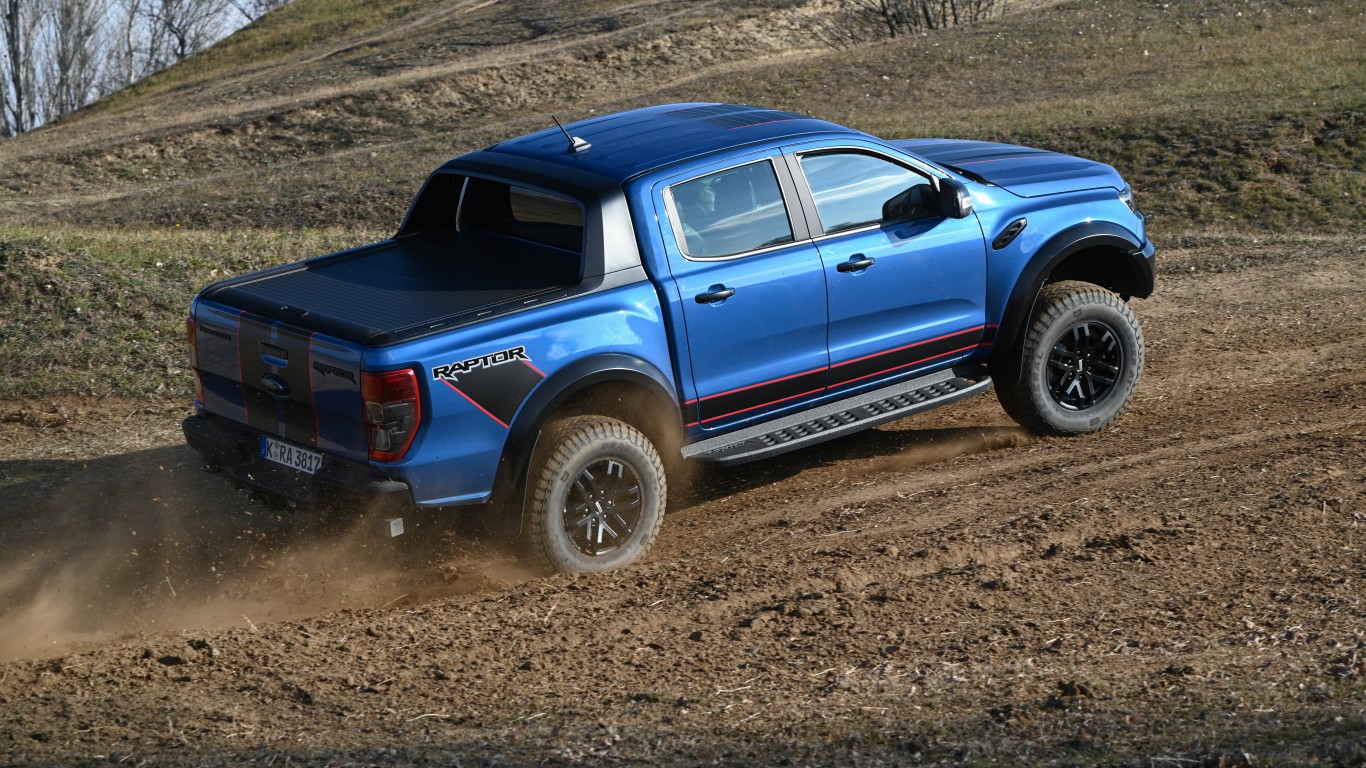
Pickup trucks have long ranked among the top-selling vehicle segments in the United States. Traditionally equipped with substantial towing and hauling capacity, high ground clearance, and of course, open beds, pickups are marketed and sold for their versatility and capability. These advantages, however, have always come at the expense of fuel economy — but that may be beginning to change.
Although pickup trucks are the least fuel efficient vehicles on the market, as a segment, they have been steadily improving. According to the Environmental Protection Agency, pickups had an average fuel economy of 20.9 miles per gallon in 2023, up from 18.0 MPG 10 years ago, and 15.7 MPG 20 years ago.
For the 2024 model year, there are still many pickups with below-average fuel efficiency. But prospective buyers who are not willing to make that compromise also have options.
Using EPA and Department of Energy data from fueleconomy.gov, 24/7 Wall St. identified the most fuel efficient pickup trucks on the market. We reviewed more than 160 available pickup truck configurations and ranked each nameplate by its most fuel efficient build, as measured by the estimated combined MPG. We reviewed data from both the 2024 and 2025 model years and ranked the most recent available year. EV models are ranked on MPGe, or MPG equivalent.
Estimated base prices for each vehicle are from Car and Driver, an automotive industry publication, and do not necessarily reflect the price of the most fuel efficient model. All other supplemental data is from the EPA and DOE.
For any vehicle, fuel efficiency is subject to a number of factors. Some of them are contingent on driving habits, but those related directly to the vehicle itself include weight, ground clearance, aerodynamics, drivetrain, and engine size.
Each of the four highest ranking pickup trucks on this list are EVs. Among them, efficiency ratings in combined highway and city driving range from 53 MPGe to 84 MPGe. According to EPA estimates, these vehicles will save drivers an average of anywhere from $2,500 to $5,250 in fuel costs over five years. These savings do not extend to the dealership lot, however. The base MSRP of the EVs on this list ranges from about $57,000 to nearly $100,000. (Here is a look at the 15 most affordable cars.)
For the 15 remaining pickup truck nameplates on this list, average combined fuel economy falls between 17 MPG and 37 MPG. As more automakers are moving away from large, 8-cylinder engines and adopting hybrid technology, larger trucks are no longer necessarily less efficient than smaller ones. Of the five highest ranking, non-EV pickups on this list, three are full-size trucks. (Here is a look at America’s 16 favorite pickup trucks.)
It is important to note that the MPG ratings used to rank these vehicles are based on the most fuel efficient configuration available, and that many of these trucks are also available with far worse gas mileage.
Why It Matters

In an effort to improve the efficiency of their fleets, automakers are increasingly moving toward smaller engines, hybrids, and EVs. Even pickup trucks, the least efficient vehicle segment on the market, are benefitting from this trend. With efficiency ratings trending upward each year, driving a pickup no longer necessarily means paying a premium at the pump.
19. Nissan Titan
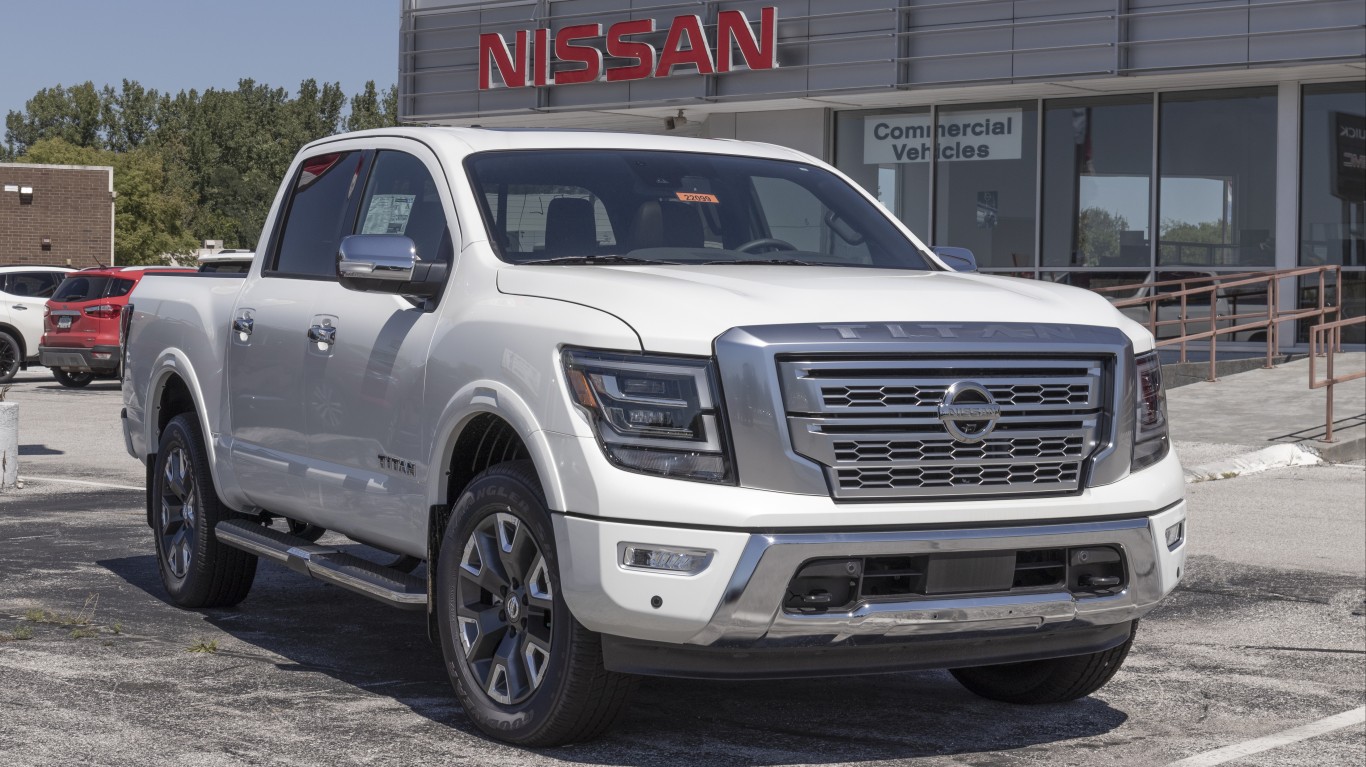
- Best available fuel efficiency (MPG): 17 combined; 15 city; 21 highway
- Most fuel-efficient engine size: 5.6 liter; 8 cylinder
- Most fuel-efficient drive-train: 2-wheel drive, rear
- Est. fuel costs: $3,800 per year; $9,250 more than avg. over 5-years
- Model year considered: 2024
- Est. base MSRP: $48,700
18. Jeep Gladiator

- Best available fuel efficiency (MPG): 19 combined; 17 city; 22 highway
- Most fuel-efficient engine size: 3.6 liter; 6 cylinder
- Most fuel-efficient drive-train: 4-wheel drive
- Est. fuel costs: $2,850 per year; $4,500 more than avg. over 5-years
- Model year considered: 2024
- Est. base MSRP: $39,790
17. GMC Canyon
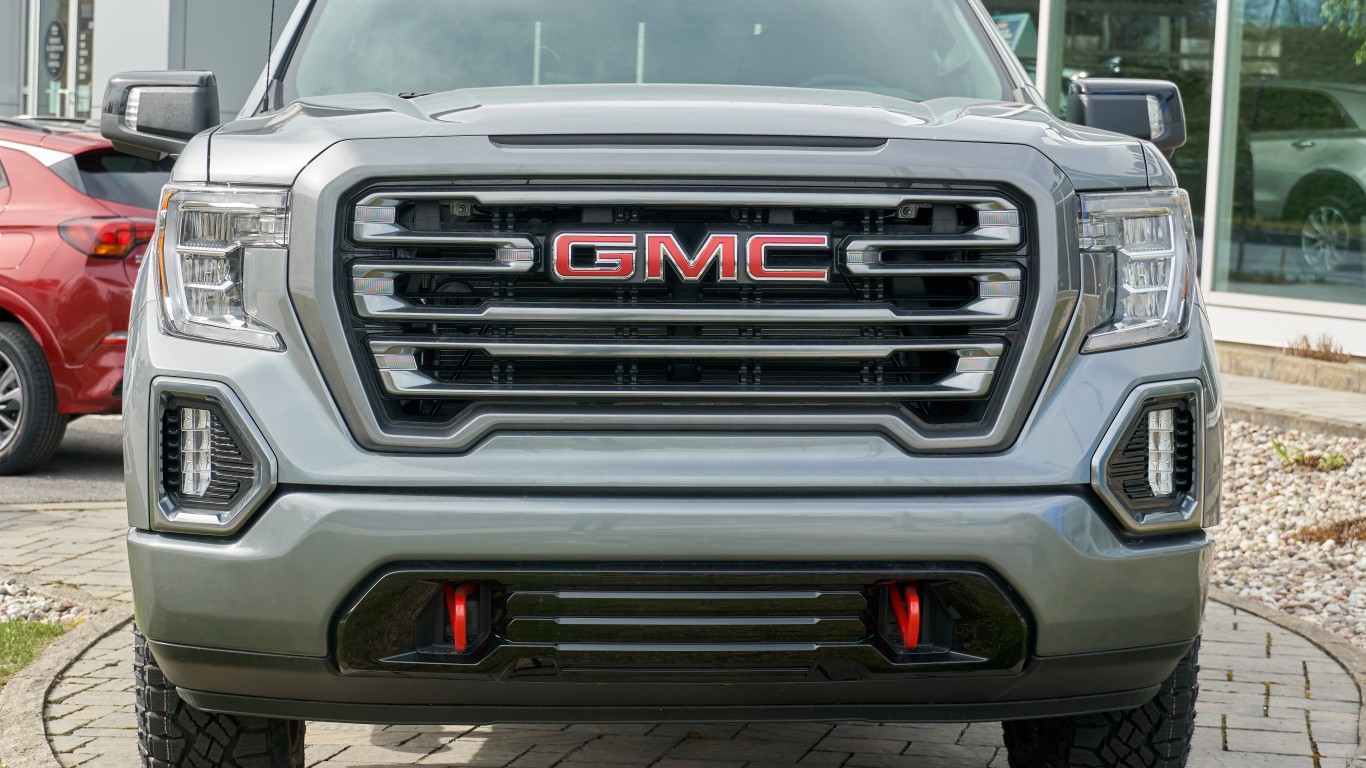
- Best available fuel efficiency (MPG): 20 combined; 19 city; 23 highway
- Most fuel-efficient engine size: 2.7 liter; 4 cylinder
- Most fuel-efficient drive-train: 2-wheel drive, rear
- Est. fuel costs: $2,700 per year; $3,750 more than avg. over 5-years
- Model year considered: 2024
- Est. base MSRP: $37,595
16. Nissan Frontier
- Best available fuel efficiency (MPG): 21 combined; 18 city; 24 highway
- Most fuel-efficient engine size: 3.8 liter; 6 cylinder
- Most fuel-efficient drive-train: 2-wheel drive, rear
- Est. fuel costs: $2,550 per year; $3,000 more than avg. over 5-years
- Model year considered: 2024
- Est. base MSRP: $32,020
15. Honda Ridgeline

- Best available fuel efficiency (MPG): 21 combined; 18 city; 24 highway
- Most fuel-efficient engine size: 3.5 liter; 6 cylinder
- Most fuel-efficient drive-train: All wheel drive
- Est. fuel costs: $2,550 per year; $3,000 more than avg. over 5-years
- Model year considered: 2024
- Est. base MSRP: $41,145
14. Chevrolet Colorado
- Best available fuel efficiency (MPG): 22 combined; 20 city; 24 highway
- Most fuel-efficient engine size: 2.7 liter; 4 cylinder
- Most fuel-efficient drive-train: 2-wheel drive, rear
- Est. fuel costs: $2,450 per year; $2,500 more than avg. over 5-years
- Model year considered: 2024
- Est. base MSRP: $31,095
13. Toyota Tundra

- Best available fuel efficiency (MPG): 22 combined; 20 city; 24 highway
- Most fuel-efficient engine size: 3.4 liter; 6 cylinder hybrid
- Most fuel-efficient drive-train: 2-wheel drive, rear
- Est. fuel costs: $2,450 per year; $2,500 more than avg. over 5-years
- Model year considered: 2024
- Est. base MSRP: $41,815
12. Ford Ranger
- Best available fuel efficiency (MPG): 22 combined; 21 city; 25 highway
- Most fuel-efficient engine size: 2.3 liter; 4 cylinder
- Most fuel-efficient drive-train: 2-wheel drive, rear
- Est. fuel costs: $2,450 per year; $2,500 more than avg. over 5-years
- Model year considered: 2024
- Est. base MSRP: $34,315
11. Ford F150

- Best available fuel efficiency (MPG): 23 combined; 22 city; 24 highway
- Most fuel-efficient engine size: 3.5 liter; 6 cylinder hybrid
- Most fuel-efficient drive-train: Part-time 4-wheel drive
- Est. fuel costs: $2,350 per year; $2,000 more than avg. over 5-years
- Model year considered: 2024
- Est. base MSRP: $38,870
10. Toyota Tacoma
- Best available fuel efficiency (MPG): 23 combined; 20 city; 26 highway
- Most fuel-efficient engine size: 2.4 liter; 4 cylinder
- Most fuel-efficient drive-train: 2-wheel drive, rear
- Est. fuel costs: $2,350 per year; $2,000 more than avg. over 5-years
- Model year considered: 2024
- Est. base MSRP: $32,995
9. Ram 1500
- Best available fuel efficiency (MPG): 23 combined; 20 city; 26 highway
- Most fuel-efficient engine size: 3.6 liter; 6 cylinder hybrid
- Most fuel-efficient drive-train: 2-wheel drive, rear
- Est. fuel costs: $2,300 per year; $2,000 more than avg. over 5-years
- Model year considered: 2025
- Est. base MSRP: $42,270
8. Hyundai Santa Cruz
- Best available fuel efficiency (MPG): 23 combined; 22 city; 26 highway
- Most fuel-efficient engine size: 2.5 liter; 4 cylinder
- Most fuel-efficient drive-train: 2-wheel drive, front
- Est. fuel costs: $2,350 per year; $2,000 more than avg. over 5-years
- Model year considered: 2024
- Est. base MSRP: $28,275
7. GMC Sierra
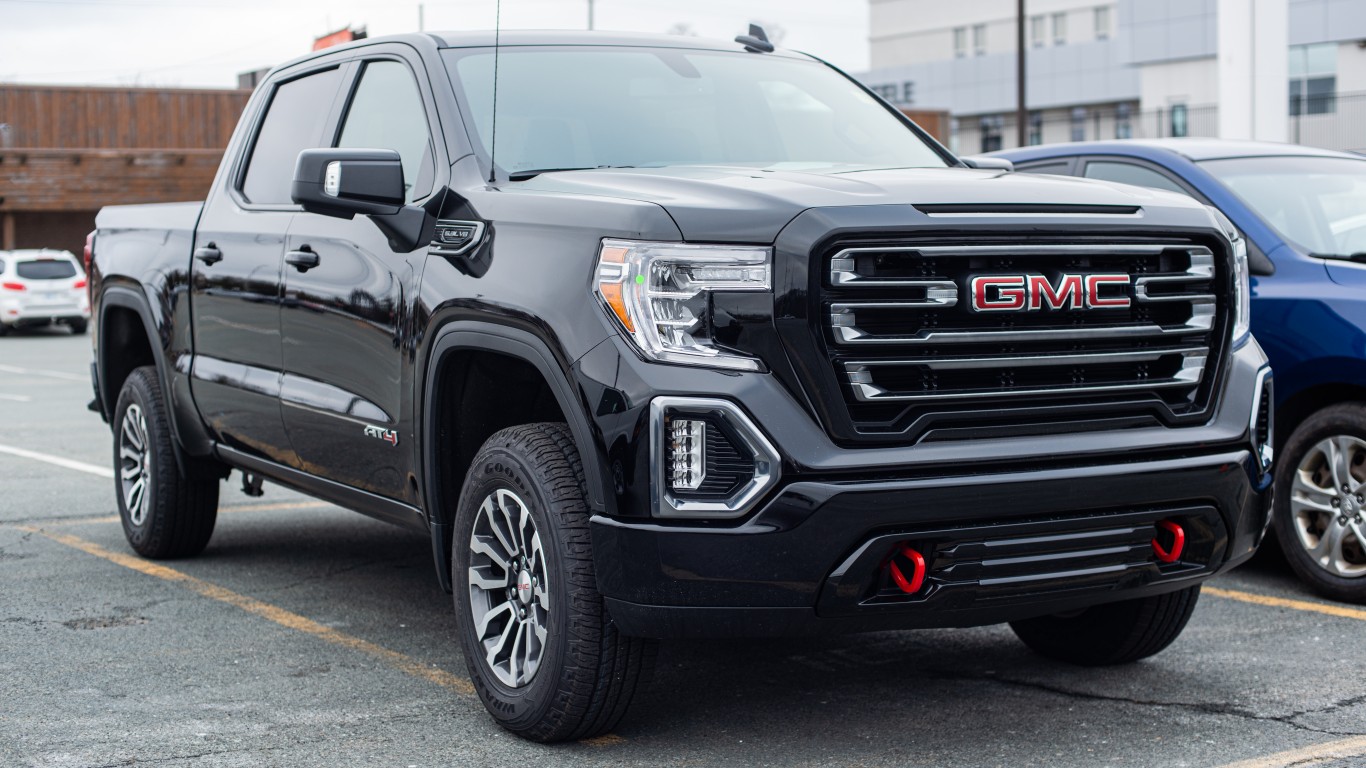
- Best available fuel efficiency (MPG): 25 combined; 23 city; 29 highway
- Most fuel-efficient engine size: 3 liter; 6 cylinder
- Most fuel-efficient drive-train: 2-wheel drive, rear
- Est. fuel costs: $2,650 per year; $3,500 more than avg. over 5-years
- Model year considered: 2024
- Est. base MSRP: $38,345
6. Chevrolet Silverado

- Best available fuel efficiency (MPG): 26 combined; 23 city; 29 highway
- Most fuel-efficient engine size: 3 liter; 6 cylinder
- Most fuel-efficient drive-train: 2-wheel drive, rear
- Est. fuel costs: $2,550 per year; $3,000 more than avg. over 5-years
- Model year considered: 2024
- Est. base MSRP: $37,445
5. Ford Maverick
- Best available fuel efficiency (MPG): 37 combined; 42 city; 33 highway
- Most fuel-efficient engine size: 2.5 liter; 4 cylinder hybrid
- Most fuel-efficient drive-train: 2-wheel drive, front
- Est. fuel costs: $1,450 per year; $2,500 less than avg. over 5-years
- Model year considered: 2024
- Est. base MSRP: $25,515
4. GMC Hummer EV
- Best available fuel efficiency (MPGe): 53 combined; 59 city; 48 highway
- Power source: 334 volt lithium ion battery; 596 amp-hr. capacity
- Most efficient drive-train: All wheel drive
- Est. charging costs: $1,450 per year; $2,500 less than avg. over 5-years
- Model year considered: 2024
- Est. base MSRP: $98,845
3. Chevrolet Silverado EV
- Best available fuel efficiency (MPGe): 67 combined; 72 city; 62 highway
- Power source: 290 volt lithium ion battery; 580 amp-hr. capacity
- Most efficient drive-train: All wheel drive
- Est. charging costs: $1,150 per year; $4,000 less than avg. over 5-years
- Model year considered: 2024
- Est. base MSRP: $74,800
2. Ford F150 Lightning
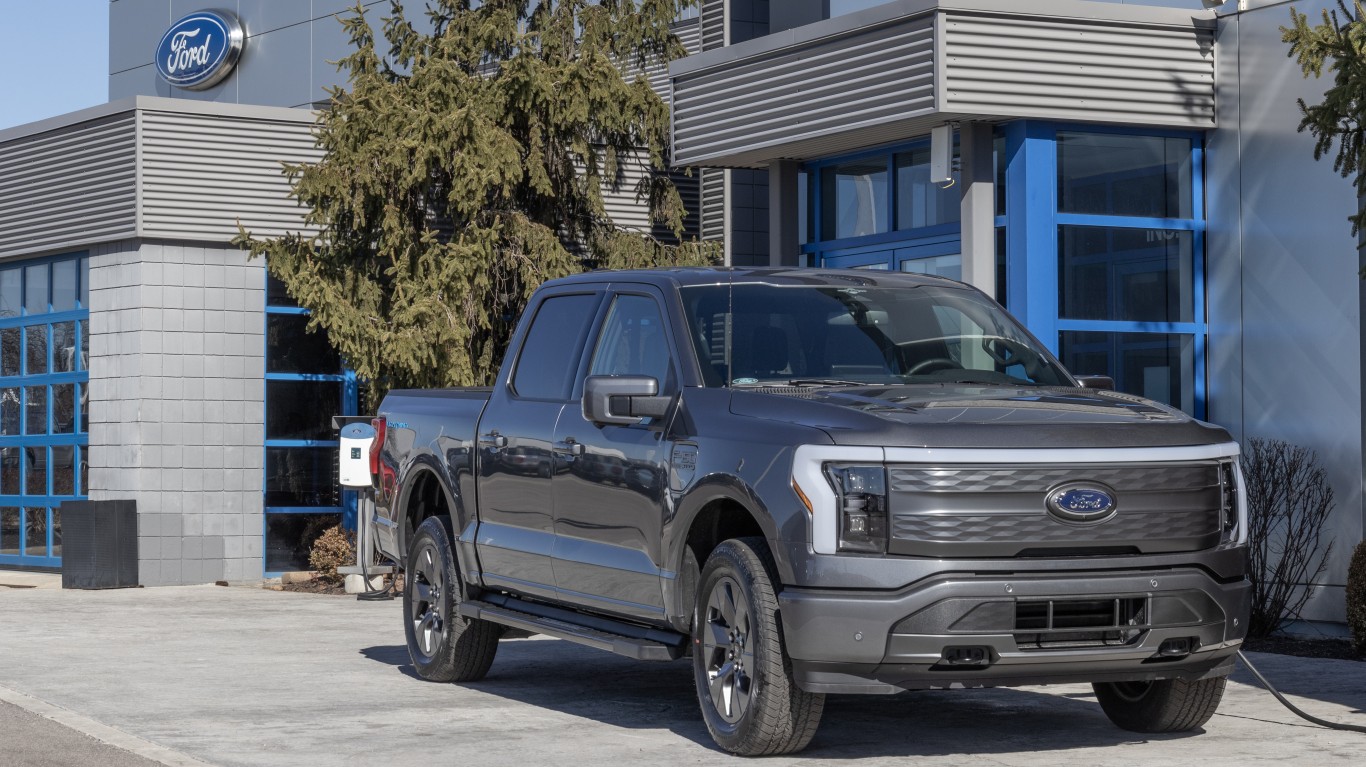
- Best available fuel efficiency (MPGe): 70 combined; 78 city; 63 highway
- Power source: 403 volt lithium ion battery; 410 amp-hr. capacity
- Most efficient drive-train: All wheel drive
- Est. charging costs: $1,100 per year; $4,250 less than avg. over 5-years
- Model year considered: 2024
- Est. base MSRP: $57,090
1. Rivian R1T

- Best available fuel efficiency (MPGe): 84 combined; 91 city; 77 highway
- Power source: 392 volt lithium ion battery; 382 amp-hr. capacity
- Most efficient drive-train: Part-time 4-wheel drive
- Est. charging costs: $900 per year; $5,250 less than avg. over 5-years
- Model year considered: 2024
- Est. base MSRP: $71,700
It’s Your Money, Your Future—Own It (sponsor)
Are you ahead, or behind on retirement? For families with more than $500,000 saved for retirement, finding a financial advisor who puts your interest first can be the difference, and today it’s easier than ever. SmartAsset’s free tool matches you with up to three fiduciary financial advisors who serve your area in minutes. Each advisor has been carefully vetted and must act in your best interests. Start your search now.
If you’ve saved and built a substantial nest egg for you and your family, don’t delay; get started right here and help your retirement dreams become a retirement reality.
Thank you for reading! Have some feedback for us?
Contact the 24/7 Wall St. editorial team.
